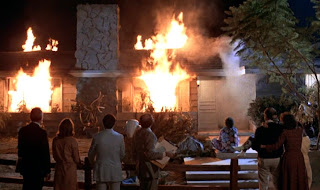In Real Life, Brooks plays "himself," an egotistical, shallow (as he gleefully admits), slightly deluded Hollywood filmmaker with delusions of grandeur. He flatters the regular folks of Phoenix in a pre-credit news conference by telling them that the most dramatic, the funniest, and the most suspenseful things are occurring "in my backyard and yours." So what better idea than to make a movie of a regular family, doing regular things, following them in their daily lives for a year, which yet somehow are more amazing and exciting than the latest hit film? Real Life dryly skewers not, as one might think, the hapless family who would allow cameras into its living room and, ostensibly, its backyard, but the media hucksters who thrive on such absurdity in the name of "reality."
 Which family offers themselves up for cinematic preservation? The Yeagers. The always-welcome Charles Grodin plays the veterinarian father who tries to corral his family into presenting its good side, but on the very night, his wife (Frances Lee McCain) has terrible menstrual cramps. The horror! Another funny-awkward bit is when their young teenage daughter, pretending for the cameras to be a famous movie star, innocently flirts with her father: "Kiss me as I've never been kissed before!" she swoons. Grodin is always a pleasure to watch in these moments, here he squirms and tries to laugh off her mugging.
Which family offers themselves up for cinematic preservation? The Yeagers. The always-welcome Charles Grodin plays the veterinarian father who tries to corral his family into presenting its good side, but on the very night, his wife (Frances Lee McCain) has terrible menstrual cramps. The horror! Another funny-awkward bit is when their young teenage daughter, pretending for the cameras to be a famous movie star, innocently flirts with her father: "Kiss me as I've never been kissed before!" she swoons. Grodin is always a pleasure to watch in these moments, here he squirms and tries to laugh off her mugging. And when he fatally botches an emergency surgery on a racehorse, on camera, Yeager begs to speak with Brooks, who narrates, "He asked to see me alone. Of course I obliged." Beat. Cut to, of course, the two sitting down in front of the camera.
And when he fatally botches an emergency surgery on a racehorse, on camera, Yeager begs to speak with Brooks, who narrates, "He asked to see me alone. Of course I obliged." Beat. Cut to, of course, the two sitting down in front of the camera.
 Ultimately we realize that the real drama is not the Yeager family, but the manipulations of Brooks as he tries to cajole everyone around him - psychiatrists, producers, journalists, etc. - to go along with him on his attempt to present "real life." A black psychology professor Brooks hired as a consultant mocks his white liberal guilt, and quits the production staff to write a blistering account of the filming. Brooks dismisses it as a book sold to "those publishers who missed out on Watergate." It gets worse from there for everyone involved.
Ultimately we realize that the real drama is not the Yeager family, but the manipulations of Brooks as he tries to cajole everyone around him - psychiatrists, producers, journalists, etc. - to go along with him on his attempt to present "real life." A black psychology professor Brooks hired as a consultant mocks his white liberal guilt, and quits the production staff to write a blistering account of the filming. Brooks dismisses it as a book sold to "those publishers who missed out on Watergate." It gets worse from there for everyone involved.Checking the credits, should I have been surprised to see Harry Shearer as co-writer? No. Perhaps the best bits have to do with the Ettinauer 2-26XL, the "most versatile camera ever made," and the sight gags, with Shearer as cameraman, are priceless. Who could possibly live a real life with this following them around?


 One doesn't have to be familiar with An American Family to get this movie, but the fact is Real Life exists as a comment on a very specific event. It doesn't come close, or even necessarily desire to, the blistering attack on television that is Network (1976), still probably the best go-to film when talking about the predictive abilities of the medium. This early mockumentary, seen today, plays a little too gently to be of classic status. Some of the one-liners Brooks get off are sub-Woody Allen, but his rant near the end of the film, as he struggles to salvage the ending of this work (should he end it like Star Wars? Maybe like Jaws!), is spot-on. And its glimpse into the future of television is uncanny. Anyone interested in Brooks, the evolution of mockumentaries, or a nice glimpse into middle-class '70s life, would do well to check out Real Life .
One doesn't have to be familiar with An American Family to get this movie, but the fact is Real Life exists as a comment on a very specific event. It doesn't come close, or even necessarily desire to, the blistering attack on television that is Network (1976), still probably the best go-to film when talking about the predictive abilities of the medium. This early mockumentary, seen today, plays a little too gently to be of classic status. Some of the one-liners Brooks get off are sub-Woody Allen, but his rant near the end of the film, as he struggles to salvage the ending of this work (should he end it like Star Wars? Maybe like Jaws!), is spot-on. And its glimpse into the future of television is uncanny. Anyone interested in Brooks, the evolution of mockumentaries, or a nice glimpse into middle-class '70s life, would do well to check out Real Life .
















.jpg)




1 comment:
This was the first American mocumentary. Years before Spinal Tap. And I disagree about it's staying power. I saw this film three months ago and was blown away that it was made 31 years ago!! Talk about seeing the future!
Post a Comment